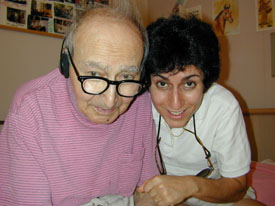One of the more painful parts of caregiving is when our loved ones with dementia no longer recognize us or forget how family members are related. Still, we can find ways to laugh.
Years ago, when my father was first showing signs of dementia and living in Wisconsin, I’d draw family trees to show him how everyone was related. He thought I was brilliant! There were only a few branches on our tree, having lost family members during the Armenian Genocide at start of last century (1915 – 1924).
Jump forward two years… He’s living in California. I wish him a Happy Father’s Day. He’s confused.

“Oh, I’m glad you’re here!” he said with a bright smile.
His eyes told the truth. He no longer remembered his daughter with whom he shared a birthday.
He looked right at me. I could have been the nurse’s assistant or an aide. Sometimes I was his son.
“Happy Father’s Day!” I said, with as much enthusiasm as I could muster.
“Father’s Day?” he asked. “Who’s the father?”
“You are!” I said, hoping he would remember.
“I am?” he asked, pointing awkwardly at himself. He paused, and then shaking his head, retorted, “You’re the father!”
Excerpted from Who’s the father?
And my father was not the only one.
In Finding the JOY in Alzheimer’s, a collection of caregivers’ JOYFUL experiences caring for their loved ones with dementia, Jamie writes, Father’s Day for Mom?
After referring to her daughter (Jamie’s mom) as he, Grandma asks, Jamie, “Are you going to buy her a Father’s Day gift?” Aye, is Grandma’s daughter a he or a she? And how can Grandma’s daughter be a father? Confused? This is the mind of people who live with Alzheimer’s. Their brains are constantly playing tricks on their memories, while caregivers jump from one assumption to another trying to figure out what their loved ones mean.
If your father is still alive and living with dementia, see how he reacts when you greet him on Father’s Day. We’d love to read your experience in the comments.








